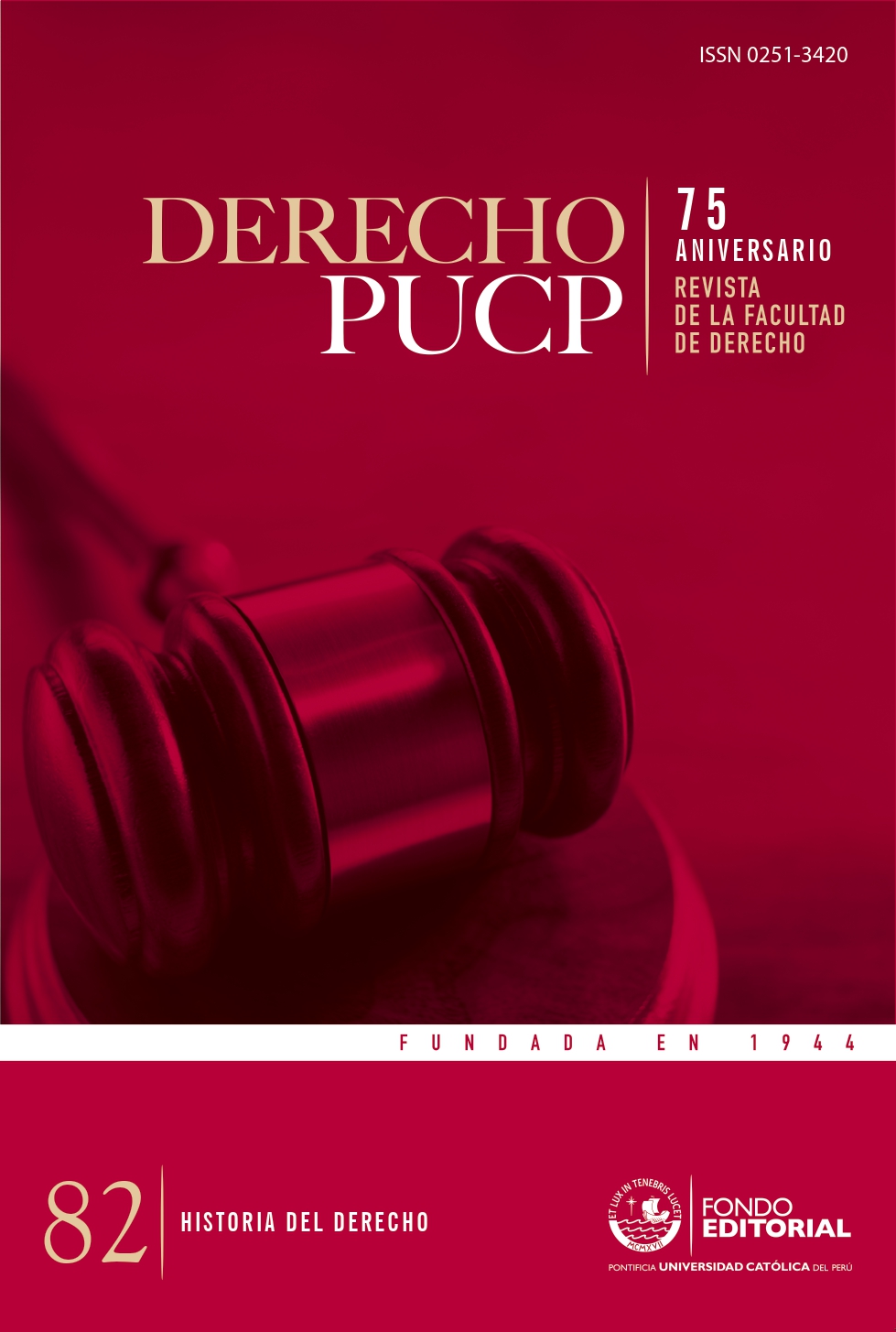«¿Qué puede aprender el derecho de la literatura?»: notas sobre la importancia de la discusión derecho/literatura en el pensamiento jurídico
DOI:
https://doi.org/10.18800/derechopucp.201901.015Palabras clave:
Movimiento derecho y literatura, narración, interpretación, estudios culturales, pensamiento jurídicoResumen
«Derecho y literatura» designa un espacio de encuentro entre los que quizás sean las disciplinas y los objetos más dispares dentro del panorama de explosión de estudios interdisciplinarios que tuvo lugar durante la segunda mitad del siglo XX. Ese espacio se desarrolló bajo la forma del «movimiento derecho y literatura». No solo demostró y demuestra una vitalidad siempre creciente, sino también una importancia muchas veces pasada por alto que lo transforma en más que una «moda», un «espacio recreativo», una excentricidad o una subespecialidad inocua que se mantiene al margen de las disciplinas que lo integran. En este trabajo me propongo repasar brevemente la trayectoria del movimiento «derecho y literatura» y abrir algunas líneas de lectura sobre la importancia de la discusión derecho/literatura durante el trayecto que va desde 1970 hasta los primeros años del nuevo milenio.
Durante ese recorrido, me interesará dar cuenta de las deudas profundas y a veces inadvertidas que algunos de los desplazamientos, discusiones nodales o cambios fundamentales de perspectiva en el pensamiento jurídico mantienen con el «derecho y la literatura».
Descargas
Citas
Balkin, J. (2005). Deconstruction’s Legal Career. Cardozo Law Review, 72(2), 719-740.
Balkin, J. & Lenvinson, S. (2008). El derecho y las humanidades: una relación incómoda. Revista Jurídica de la Universidad de Palermo, 9(1), 97-227.
Ball, M. (1990). The Legal Academy and Minority Scholars. Harvard Law Review, 103(8), 1855-1863. https://doi.org/10.2307/1341319
Binder, G. & Weisberg, R. (2000). Literary Criticism of Law. Princeton: Princeton University Press. https://doi.org/10.1515/9781400823635
Bonilla, D. (2017a). El análisis cultural del derecho. Entrevista a Paul Kahn. Isonomía, 46, 131-154.
Bonilla, D. (2017b). Introducción. Análisis cultural del derecho y jueces en perspectiva comparada. En P. Kahn, Construir el caso. El arte de la jurisprudencia. Bogotá: Siglo del Hombre.
Brooks, P. (1998). A Slightly Polemical Comment on Austin Sarat, Yale Journal of Law & the Humanities, 10(2). Recuperado de http://digitalcommons.law.yale.edu/yjlh/vol10/iss2/8
Coombe, R. (1989). «Same as It Ever Was»: Rethinking the Politics of Legal Interpretation. McGill Law Journal, 34, 603-652.
Coombe, R. (2001). Is there a Cultural Studies of Law? En T. Miller (Ed.), A Companion to Cultural Studies (pp. 36-62). Oxford: Blackwell. https://doi.org/10.1002/9780470998809.ch3
Cover, R. (2002). Derecho, narración y violencia. Poder constructivo y poder destructivo en la interpretación judicial. Barcelona: Gedisa.
Dworkin, R. (1982). Law as Interpretation. Critical Inquiry, 9(1), 179-200. https://doi.org/10.1086/448194
Fiss, O. (1982). Objectivity and Interpretation. Stanford Law Review, 34(4), 739- 763. https://doi.org/10.2307/1228384
Gewirtz, P. (1996). Narrative and Rhetoric in the Law. En P. Brooks & P. Gewirtz (Eds.), Law’s Stories: Narrative and Rhetoric in the Law (pp. 2-13). New Haven: Yale University Press.
Kahn, P. (2001). El análisis cultural del derecho. Una reconstrucción de los estudios jurídicos. Barcelona: Gedisa.
Kahn, P. (2016). Making the Case: The Art of the Judicial Opinion. New Haven: Yale.
Levinson, S. & Mailloux, S. (Eds.) (1988). Interpreting Law and Literature. Evanston: Northwestern University Press.
Massaro, T. (1989). Empathy, Legal Storytelling, and the Rule of Law: New Words, Old Wounds? Michigan Law Review, 87(8), 2099-2127. https://doi.org/10.2307/1289301
Mezey, N. (2015). Mapping a Cultural Studies of Law. En A. Sarat & P. Ewick (Eds.), The Handbook of Law and Society (pp. 37-55). Oxford: Wiley-Blackwell. https://doi.org/10.1002/9781118701430.ch3
Peters, J. S. (2005). Law, Literature, and the Vanishing Real: On the Future of an Interdisciplinary Illusion. PMLA, 20(2), 442-452. https://doi.org/10.1632/003081205x52383
Sáenz, M. J. (2018). Comentario bibliográfico: Making the Case. The Art of the Judicial Opinion. Academia, 15(30), 283-295.
Sáenz, M. J. (2019a). Derecho y literatura. Eunomía, 16, 273-282. https://doi.org/10.20318/eunomia.2019.4706
Sáenz, M. J. (2019b). Derecho y literatura: el proyecto de Martha Nussbaum. Doxa, 42.
Sarat, A. & Simon, J. (2001). Beyond Legal Realism: Cultural Analysis, Cultural Studies, and the Situation of Legal Scholarship. Yale Journal of Law & Humanities, 13(1), 3-32.
Scarry, E. (1996). Speech Acts in Criminal Cases. En P. Brooks & P. Gewirtz (Eds.), Law’s Stories: Narrative and Rhetoric in the Law (pp. 165-174). New Haven: Yale University Press.
Schlag, P. (1990). Normative and Nowhere to Go. Stanford Law Review, 43(1), 167-191. https://doi.org/10.2307/1228996
Ward, I. (1993). The Educative Ambition of Law and Literature. Legal Studies, 13(3), 323-331. https://doi.org/10.1111/j.1748-121x.1993.tb00489.x
Ward, I. (1995). Law and Literature. Possibilities and Perspectives. Cambridge: Cambridge University Press.
West, R. (2000). Are There Nothing but Texts in This Class? Interpreting the Interpretive Turns in Legal Thought. Chicago-Kent Law Review, 76(2), 1125-1165.
West, R. (2011). Literature, Culture, and Law at Duke University. En A. Sarat, C. Frank & E. Anderson (Eds.), Teaching Law and Literature (pp. 98-113). Nueva York: Modern Language Association.
White, J.B. (1985 [1973]). The Legal Imagination (Abridged Edition). Chicago: Chicago University Press.
White, J.B. (1989). What Can a Lawyer Learn from Literature? Harvard Law Review, 102(8), 2014-2047. https://doi.org/10.2307/1341366
White, J.B. (2007). Interview with James Boyd White. Michigan Law Review, 105(7), 1403-1419.
White, J.B. (2011). The Cultural Background of The Legal Imagination. En A. Sarat, C. Frank & E. Anderson (Eds.), Teaching Law and Literature (pp. 29-39). Nueva York: Modern Language Association.
Williams, P. (1991). The Alchemy of Race and Rights. Cambridge: Harvard University Press.
Publicado
Cómo citar
Número
Sección
Licencia
Derechos de autor 2019 Derecho PUCP

Esta obra está bajo una licencia internacional Creative Commons Atribución 4.0.




